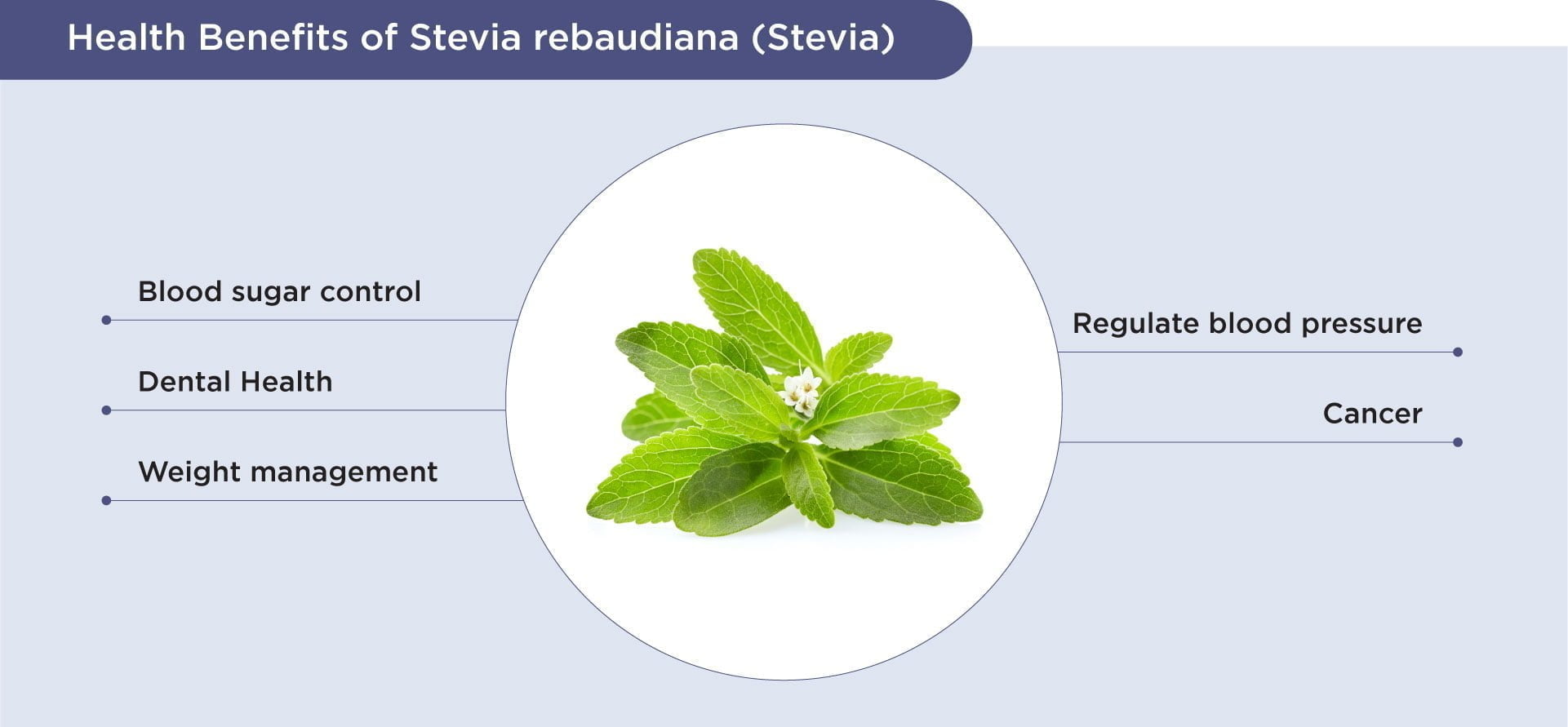Stevia rebaudiana (Stevia)

Stevia rebaudiana (Stevia)
Stevia rebaudiana (Bertoni) is a small perennial shrub from the Asteraceae family that is native to Paraguay, Brazil and Argentina. The leaves have been used for centuries in medicine and as a sweetener to drinks such as maté, a green herbal tea. The botanist named Moises Santiago Bertoni was the first person who discovered this plant in 1887. In 1931, two French chemists had identified the stevioside, a primary steviol glycoside that gives its distinct sweet taste from the stevia leaves, which can be up to 250 to 300 times sweeter than sucrose 1. The stevia plant is now commercially cultivated in Argentina, Brazil, Columbia, Paraguay, China, Japan, Malaysia, South Korea, Vietnam, Israel, Australia, Kenya and the United States 2.
Nutritional Facts
Stevia leaves have good essential elements in fresh as well as dried leaves such as calcium, potassium, magnesium, iron, copper, manganese, zinc and sodium. Besides, it is also rich in protein, fiber, vitamins, phenolic acids and antioxidants 5. The stevia plant also contains 11 major steviol glycosides in which the most abundant are rebaudioside A and stevioside 1.
Published Health Benefits
1. Blood sugar control
Research has shown that there is no accumulation of stevia (or any by-product of stevia) in the body during metabolism due to its poor absorption in the digestive tract. This contributes to the fact that stevia has zero calories and does not raise blood glucose or insulin levels when ingested 1.
2. Dental Health
Stevia is widely used in toothpaste. It possesses antimicrobial properties which can reduce the chances of getting a plaque by 60%, thus helping to prevent dental caries 5.
3. Weight management
Stevia has the appetite-suppressing effect which helps decrease the calorie intake per day. It is a ‘non-calorie sweetener’ which satisfies the sweet tooth without the downside of excess calories 6.
4. Regulate blood pressure
Certain glycosides in Stevia have been found to dilate blood vessels, increase sodium excretion and urine output which can help in lowering blood pressure 3. Some studies suggest that stevia might have cardiotonic actions which help in normalizing blood pressure and regulating the heartbeat 4.
5. Cancer
Stevia contains antioxidant compounds known as kaempferol which can reduce the risk of pancreatic cancer by 23% 7.
References:
1. Ashwell, M. (2015). Stevia, Nature’s Zero-Calorie Sustainable Sweetener. Nutrition Today, 50(3), 129-134. https://doi.org/10.1097/nt.0000000000000094
2. Samuel, P., Ayoob, K. T., Magnuson, B. A., Wolwer-Rieck, U., Jeppesen, P. B., Rogers, P. J., Rowland, I. & Matthews, R. (2018). Stevia leaf to stevia sweetener: Exploring its science, benefits and future potential. The Journal of Nutrition, 148 (7): 1186-1205. https://doi.org/10.1093/jn/nxy102
3. Herbst, M. (2021). Fact Sheet on the Sugar Substitute Stevia. Retrieved 21 October 2021, from https://cansa.org.za/files/2021/05/Fact-Sheet-on-the-Sugar-Substitute-Stevia-May-2021.pdf
4. Chughtai, M. F. J., Pasha, I., Zahoor, T., Khaliq, A., Ahsan, S., Wu, Z., Nadeem, M., Mehmood, T., Amir, R. M., Yasmin, I., Liaqat, A. & Tanweer, S. (2020). Nutritional and therapeutic perspectives of Stevia rebaudiana as emerging sweetener; a way forward for sweetener industry. Journal of Food, 18 (1): 164-177. https://doi.org/10.1080/19476337.2020.1721562
5. Gandhi, S., Gat, Y., Arya, S., Kumar, V., Panghal, A. & Kumar, A. (2018). Natural sweeteners: health benefits of stevia. Foods and Raw Materials, 6 (2): 392-402. https://doi.org/10.21603/2308-4057-2018-2-392-402
6. Elnaga, N. I. E. A., Massoud, M. I., Yousef, M. I. & Mohamed, H. H. A. (2016). Effect of stevia sweetener consumption as non-caloric sweetening on body weight gain andbiochemical’s parameters in overweight female rats. Annals of Agriculture Science, 61 (1): 155-163. https://doi.org/10.1016/j.aoas.2015.11.008
7. Lee, J., & Kim, J. H. (2016). Kaempferol Inhibits Pancreatic Cancer Cell Growth and Migration through the Blockade of EGFR-Related Pathway In Vitro. PloS one, 11(5), e0155264. https://doi.org/10.1371/journal.pone.0155264








